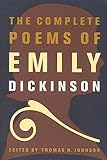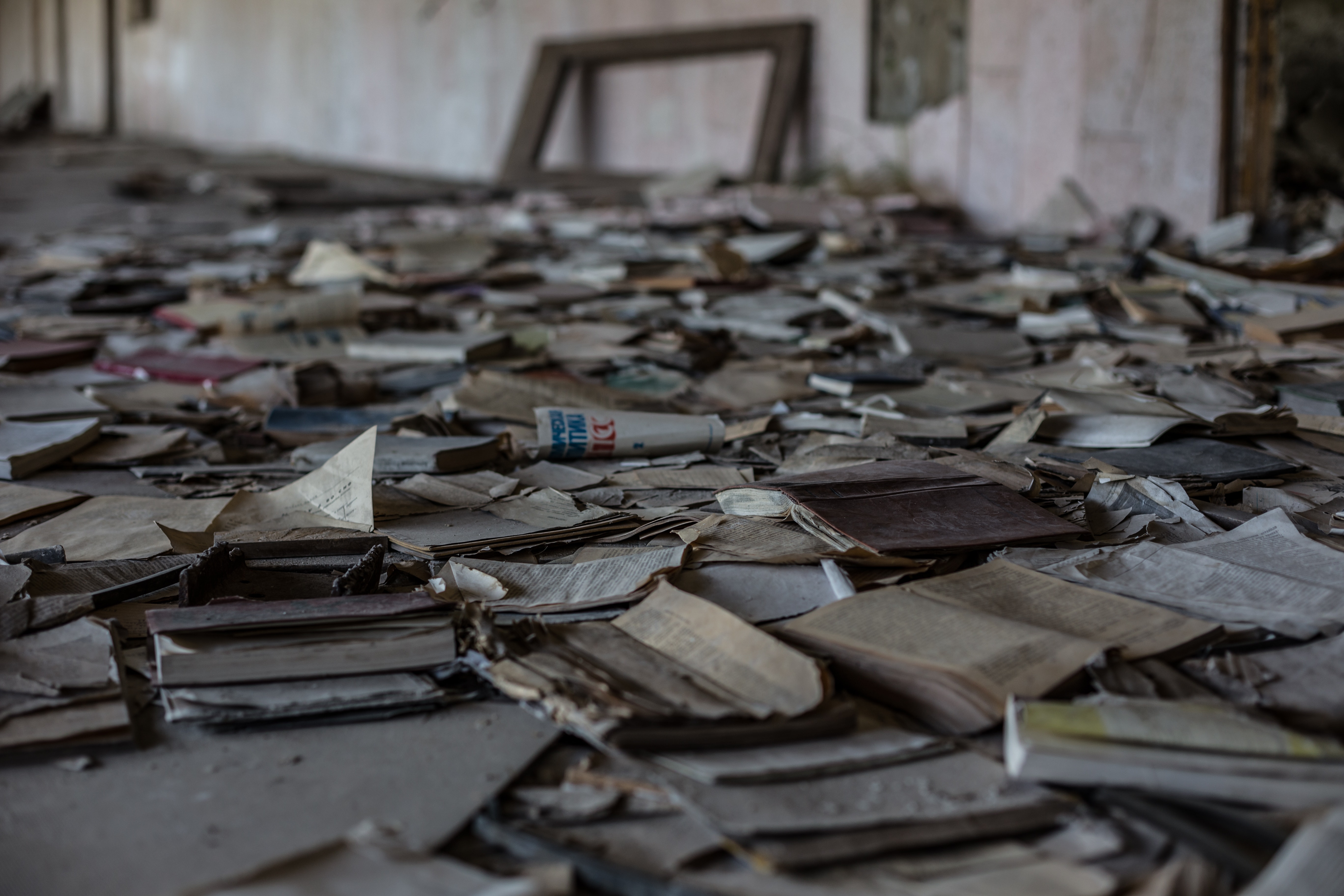Books are sacred objects. Books are garbage. Between, the books with badly bent covers on the parsons tables of Midas Muffler and orthopedists’ waiting rooms. Books bought by the yard to complement the colors in the redecorated den. The tumbled remainders of remainders on the dollar store shelf, Geoff Dyer next to Christian fiction. The gorgeously designed new releases presented on the tabletops of independent bookstores as if they were hand-painted confections in a vitrine at Teuscher. Then there is the final stop, where some books are no longer figurative garbage. They are actual trash.
I no longer go to church, since here in the Catskills we have the dump. Ours is the purest iteration of the cathedral: on a windswept rise under a ceiling of sky, the enclosing mountains the choir waiting silently to begin. Beneath the metal eaves of a soaring peaked roof, mortal leavings gather.
The dump’s offering plate is a discarded sideboard on which parishioners jettison belongings someone else might yet find useful. Old plates. Used mugs. Videotapes (Sylvester Stallone in his salad days, Jane Fonda in very small workout wear, cartoon features once prized by children). Stuffed animals. Inscrutable decorations for such holidays as the Festooning of the Kitchen with Inspirational Adages on Little Faux Chalkboards. Books. Boxes and boxes of books, soaking up the ambient humidity and anything that might have spilled on its way to interment in the great roll-off sepulchers that swallow couches, wheels that will never roll again, and black plastic bags in their hundreds. Books that are no longer wanted, because—Long-ago read? Owners moved, downsizing, died? Gifts from now-despised givers?
 Here is where a book reaches the bottom of the narrative ladder that, as in Black Beauty, describes life’s trajectory ever downward, unless, at the end sudden redemption plucks the unfortunate from final doom. I root through piles of superannuated World Book Encyclopedias and Ultimate Grill cookbooks and find what I am looking for but did not know I was. More than occasionally slightly mildewed, but that’s not always a disqualifier.
Here is where a book reaches the bottom of the narrative ladder that, as in Black Beauty, describes life’s trajectory ever downward, unless, at the end sudden redemption plucks the unfortunate from final doom. I root through piles of superannuated World Book Encyclopedias and Ultimate Grill cookbooks and find what I am looking for but did not know I was. More than occasionally slightly mildewed, but that’s not always a disqualifier.
These are the definition of a gift. They stir the rescuer’s impulse; they recall past happy lives spent in narrow aisles of the Strand, sitting on the floor at the old used-textbook annex of the Barnes & Noble on Fifth Avenue, book barns and yard sales and stoop sales. Not that I’ve never offloaded books myself. A library fair finally received the collection of philosophy and Middle English works I realized, after boxing and unboxing them through the course of several moves, would never be cracked again. I don’t like to get rid of books, though I do—they tell a personal history, I imagine with obvious false hope, my grandchildren will one day be fascinated to trace. Never at the dump, though. I use the dump for retrieval only.
 Today the gems do not hide. They are in their open box. Today’s trash is the complete Emily Dickinson in hardcover, with dust jacket. Today’s detritus is an unread Penguin Classics Don Quixote. Today’s undesirable is Of Human Bondage in a Modern Library edition. The sight of a virgin Penguin is alluring enough. But it’s the running torchbearer on the cover of a Modern Library that rouses an atavistic urge sharp as hunger. The Modern Library editions my parents collected when they were in college were the backdrop against which the cinema of life unreeled. Of course I would collect them myself as soon as I was on my own. I was the reader envisioned by Boni & Liveright in 1917 when they conceived the Modern Library imprint: eager to attain culture in the form of immortal literature, but short-pocketed.
Today the gems do not hide. They are in their open box. Today’s trash is the complete Emily Dickinson in hardcover, with dust jacket. Today’s detritus is an unread Penguin Classics Don Quixote. Today’s undesirable is Of Human Bondage in a Modern Library edition. The sight of a virgin Penguin is alluring enough. But it’s the running torchbearer on the cover of a Modern Library that rouses an atavistic urge sharp as hunger. The Modern Library editions my parents collected when they were in college were the backdrop against which the cinema of life unreeled. Of course I would collect them myself as soon as I was on my own. I was the reader envisioned by Boni & Liveright in 1917 when they conceived the Modern Library imprint: eager to attain culture in the form of immortal literature, but short-pocketed.
I begin reading that night. Philip, the misplaced orphan, who is like a book and also like Maugham himself, finds lost volumes on a shelf. Philip’s severe guardian bought books reflexively but did not read much: “he forgot the odd lots he had bought at one time and another because they were cheap.” And so, among the dry dust of pedagogy, Philip finds some real “old-fashioned novels.” As he read, he forgot “the life about him” and “formed the most delightful habit in the world, the habit of reading: he did not know that thus he was providing himself with a refuge from all the distress of life; he did not know either that he was creating for himself an unreal world which would make the real world of every day a source of bitter disappointment.” How had I missed Maugham before?
What you had forgotten, the dump remembers. It addresses all manner of grave omissions and gaps. That is what I want to believe, and at my place of worship I believe anything I wish.
Whatever led these books to have been discarded sometime close to my Friday 11 a.m. visit? I don’t know. Happenstance is a meaningless miracle with no origin. The dump and what you find there, or don’t, is just one of those things.
I open the cover and see this was a book meant for the long haul, for possession and the permanent shelf. The original owner had affixed a bookplate. These delightful claims on the posterity of one’s books have fallen into disuse. Because the idea of building a library—a lasting monument to character—has itself fallen into disuse in days when it is a moral superiority to get rid of the “unuseful.” The plate is an atmospheric woodcut depicting two figures (or perhaps the same one in a time-lapse portrayal of hope), one defeated and one who has risen to gesture aspiringly at the night sky. Ad Astra reads its legend—To the Stars.
In another two weeks my own garbage has piled up warningly, predictable as few things are anymore. The lids on the recycling bins are askew, plastic and tin looking to make their escape. So I load the truck again. I don’t permit myself to look at the old sideboard until I’ve finished my final task: a walk down the hill to the scrap metal mountain, there to toss with a clang the Christmas tree holder that’s outlived its usefulness. Then I head back up and into the nave, eye searching for the telltale heap of cardboard boxes that signals ripe pickings. No such luck. There is only one small box on the ground; I fear an old Thermos or, worse, pot holders. Instead—and this I swear, for only a sociopath lies in church—there are only two books. I am suddenly struck, or struck back to the moment where you get born again.
 As if one begat the other, the two are stacked, bound together by the design of serendipity. What I see is a message. What I see is The Anatomy of Revolution arising from The Nature of Prejudice.
As if one begat the other, the two are stacked, bound together by the design of serendipity. What I see is a message. What I see is The Anatomy of Revolution arising from The Nature of Prejudice.
I have been an atheist for decades, but I have also long bent to collect pennies from the dirt, believing them portents of luck. The dump embraces both aspects of an inexplicable persistence. It is a place of generosity. It is an oracle. Today I think I was right about the church part. Maybe only god can help us now. But first, I look well at what is found by chance at the same time it is put right in my hands.
Image Credit: Pexels/Wendelin Jacober.










